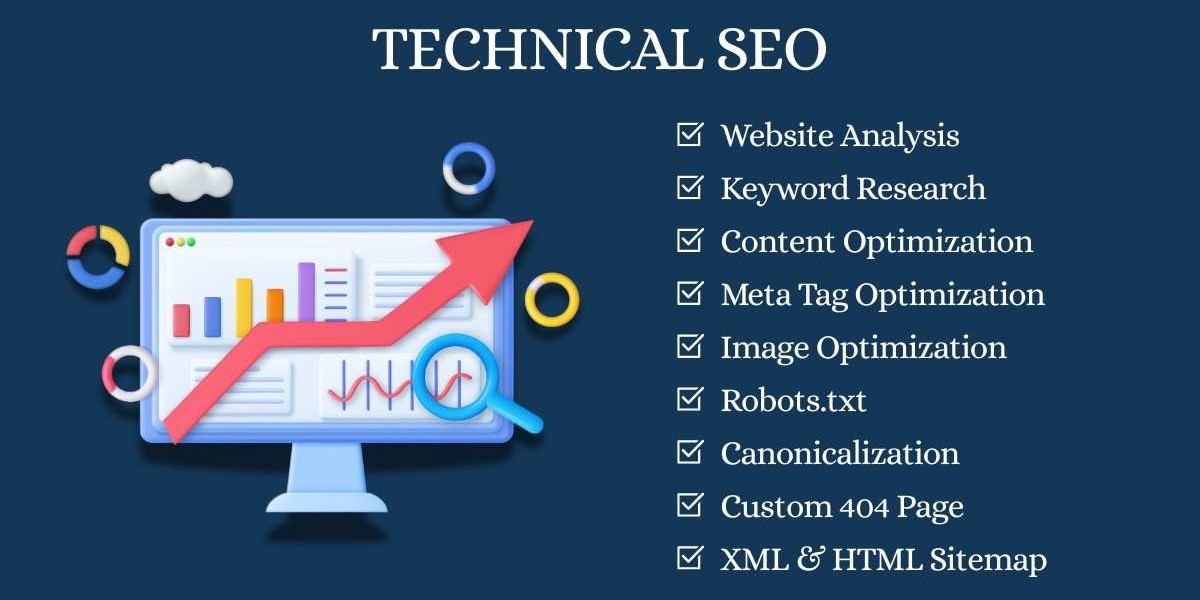In the digital marketing world, content and backlinks often take center stage when people talk about search engine optimization (SEO). While these elements are vital, there’s another side to SEO that is equally critical—technical SEO. Without a technically sound website, even the most engaging content and strongest backlink profile may fail to achieve their full potential.
This article explains what technical SEO is, why it matters for search rankings, and how businesses can implement it to build stronger online visibility.
What Is Technical SEO?
Technical SEO refers to the backend optimizations that make a website easier for search engines to crawl, index, and rank. It focuses on improving the infrastructure of a site so that both users and search engines can navigate it smoothly.
Key components of technical SEO include:
Site Speed: How fast your web pages load.
Mobile-Friendliness: Whether your site adapts seamlessly to different screen sizes.
Crawlability: How easily search engine bots can access your content.
Indexability: Ensuring the right pages appear in search results.
Site Architecture: A logical structure that makes navigation intuitive.
Security: HTTPS encryption for user protection and trust.
In short, technical SEO sets the foundation for your website’s success. Without it, all other SEO efforts can be undermined.
Why Technical SEO Is Crucial for Rankings
Search engines want to deliver the best results to users—not just in terms of content but also in usability. If your site loads slowly, has broken links, or creates a frustrating experience, users will leave. Search engines notice this behavior and lower your rankings.
Here’s why technical SEO is indispensable:
Improves User Experience: A fast, stable, and mobile-friendly site keeps users engaged.
Boosts Crawl Efficiency: Search engines can easily find and index your pages.
Enhances Rankings: Google prioritizes sites that meet technical best practices.
Supports Other SEO Efforts: Even the best content won’t rank without proper indexing.
Future-Proofs Your Site: Adapting to Google’s evolving algorithms requires strong technical foundations.
Core Elements of Technical SEO
1. Website Speed
Page speed is a confirmed ranking factor. If your site takes more than a few seconds to load, users will abandon it. To improve speed:
Compress images and use next-gen formats like WebP.
Minimize CSS and JavaScript files.
Use caching and a Content Delivery Network (CDN).
2. Mobile Optimization
With mobile-first indexing, Google primarily uses the mobile version of a site for ranking. Responsive design, fast-loading mobile pages, and easy-to-use navigation are non-negotiable.
3. Crawlability
If search engines can’t crawl your site, they can’t index it. Use robots.txt files properly, maintain a clean sitemap, and avoid blocking important pages.
4. Indexability
Sometimes pages exist but aren’t indexed due to duplicate content, canonical issues, or noindex tags. Regularly check indexing status in Google Search Console.
5. Secure Website (HTTPS)
Google favors secure sites. Migrating to HTTPS builds trust with users and prevents browsers from flagging your site as unsafe.
6. Site Architecture
A logical hierarchy ensures users and search engines can find content easily. Use internal linking to guide visitors and spread link equity across your site.
7. Structured Data
Adding schema markup helps search engines understand your content better, enabling rich results like star ratings, FAQs, and product details.
Tools to Audit and Improve Technical SEO
Numerous tools can help diagnose and fix technical SEO issues:
Google Search Console: Monitors crawl errors, indexing status, and performance.
Screaming Frog SEO Spider: Crawls websites to find broken links, duplicate content, and redirects.
GTmetrix / PageSpeed Insights: Measures site speed and provides optimization tips.
Ahrefs / SEMrush: Comprehensive tools for technical audits, backlinks, and keyword data.
These tools help you identify weaknesses and prioritize fixes.
Common Technical SEO Mistakes
Even well-optimized websites can suffer from technical issues. Some of the most common mistakes include:
Slow-loading pages due to unoptimized images or excessive scripts.
Duplicate content from poor canonicalization.
Improper use of robots.txt blocking important pages.
Missing or incorrect XML sitemaps.
Lack of HTTPS security.
Mobile usability errors such as small fonts or unclickable buttons.
Regular audits prevent these mistakes from dragging down rankings.
The Connection Between Technical SEO and Core Web Vitals
Core Web Vitals—Google’s metrics for loading, interactivity, and visual stability—are closely tied to technical SEO. By improving Largest Contentful Paint (LCP), First Input Delay (FID), and Cumulative Layout Shift (CLS), you directly enhance both user experience and rankings.
Technical SEO is no longer just about backend tweaks—it’s about aligning with Google’s focus on real-world performance.
Why You May Need Professional Support
While many technical SEO tasks can be managed in-house, some require advanced expertise. From site migrations to fixing crawl errors and implementing structured data, the process can be complex. Partnering with professionals like mediaupshift ensures your technical SEO is executed properly, setting the stage for higher rankings and long-term success.
Conclusion
Technical SEO is the foundation of any successful SEO strategy. It ensures your site is fast, secure, crawlable, and user-friendly—all factors that search engines prioritize when ranking websites. Without it, even the best-written content and strongest backlink strategies won’t deliver results.
By focusing on site speed, mobile optimization, crawlability, indexability, security, architecture, and structured data, you build a solid foundation for growth. Regular audits, attention to Core Web Vitals, and professional expertise where needed will keep your site competitive in an ever-changing digital landscape.
In the end, technical SEO is not just about pleasing search engines—it’s about creating a website that delivers seamless, enjoyable experiences for users. And when users are happy, rankings naturally follow.






























